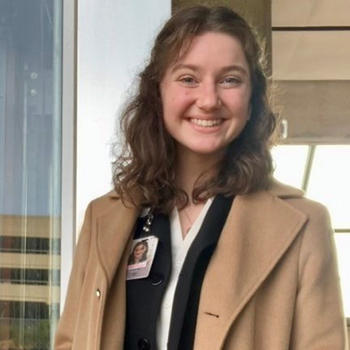In This Story

Before coming to Mason, Molly Izer worked at a factory and on a family-owned farm in rural Oregon. Now she’s walking the famous marble corridors of the U.S. Capitol Building in Washington, D.C., as a Congressional intern. It should be pointed out that Izer, who is majoring in government and international politics at the Schar School, is an 18-year-old freshman.
Izer lives on campus in the Honors College Learning Community which gives students the opportunity to live together, study together, and grow in community alongside one another. We had the opportunity to ask Izer some questions about her internship.
Schar School: Can you tell us about your internship on Capitol Hill?
Molly Izer: I am currently working for U.S. Rep. Earl Blumenauer (D-OR) in the House of Representatives as a legislative affairs intern. I have loved the internship so far. In addition to having a hard-working and brilliant staff, Congressman Blumenauer is engaged in quite a few projects on the Ways and Means Committee and advocates for progressive policies.
SS: What issues do you deal with?
MI: I’ve enjoyed getting involved in climate legislation the most, given its urgency. While it is immensely frustrating to wait on Congress to act on various issues I find important, being able to get intimately involved with the process has somewhat alleviated that frustration—but don’t get me started on the reconciliation negotiations!
I am mostly hoping to gain a deeper understanding of the legislative process, and to connect concepts that I have only learned of in a hypothetical sense to a very real and influential body.
SS: How did your previous experiences at home in Oregon help you secure a Congressional internship?
MI: Given that I am a freshman and congressional offices generally prefer more [experienced] students, I believe the deciding factor was the extensive engagement I’ve had in the district Congressman Blumenauer represents, Oregon’s 3rd District. K.C. Hanson, the chair of the Oregon Democratic Party, agreed to write a letter of recommendation because of my involvement in local and state politics.
In Oregon, I completed my senior year of high school remotely while working in an industrial factory. I also worked for several years at a small family-owned farm. The duality of these two fields gave me a deep understanding of the working class that I think is particularly lacking in [national politics]. My parents are small business owners and their influence and guidance has taught me to constantly connect back to “the real world”—that is, the real impact that government has on lives.
In my junior year of high school, a coworker and I founded a grassroot [organization] dedicated to mobilizing youth for progressive causes in rural areas. Through my work as manager, I became closely involved in local politics, and worked with local organizers to host events, write and advocate for policies, and teach community engagement, policy writing, and local organizing to other youth advocates.
Before committing to Mason, I taught some material that was written by [Schar School Associate Professor Jennifer N. Victor] at one of the grassroot policy-writing workshops I ran in Oregon. Working with marginalized communities in rural areas emphasized the importance of what we do in Washington; it is easy to dehumanize the legislative process when we learn about it because the ideas are so complex that they instill a cognitive separation between theory and reality. In pondering the possibility of what institutions could achieve, we forget to consider how they are currently operating.
The cognitive dissonance not only separates us from solutions, it also erases the parts of government that make it worth the effort. By grounding solutions in impacts, we can appreciate the policies that change lives.
SS: How has your time at Mason been so far?
MI: Mason and the Schar School have exceeded my expectations in providing both an intensive and applicable academic workload. I can confidently say that while I expected college to change my perspectives, I found that it was my scope, rather than perspective, that had changed.
In addition, my classes seem to complement each other in a way that allows me to make connections across several different courses, which has allowed me to view problem-solving as a more multidisciplinary task.
I have, of course, enjoyed all my professors thus far, but the professor and course that I can confidently say is the favorite is GOV 103 with Jennifer Victor. In addition to incredibly prescient and relevant discussions, Dr. Victor is great at encouraging student engagement. The opportunity to discuss current events with my peers in the context of American institutions has been extremely valuable.
SS: What are your plans for your time at Mason?
MI: My most ambitious goal is to intern in both houses of Congress and the executive branch. I also want to continue the research I am currently working on with Dr. Victor—I think there is so much I can learn from her and the process of research itself. I am currently coding Congressional caucus data for her ongoing data compilation. In addition, Dr. Victor and I are in the process of coauthoring a paper on the persistence of Congressional caucuses and the causes of their longevity.
SS: Do you have any advice for prospective students?
MI: Don’t feel pressure to fulfill the college student archetype—in that same vein, don’t feel pressure to resist it, either. No one else gets to decide what your education will look like. It will be exactly what you make of it.
